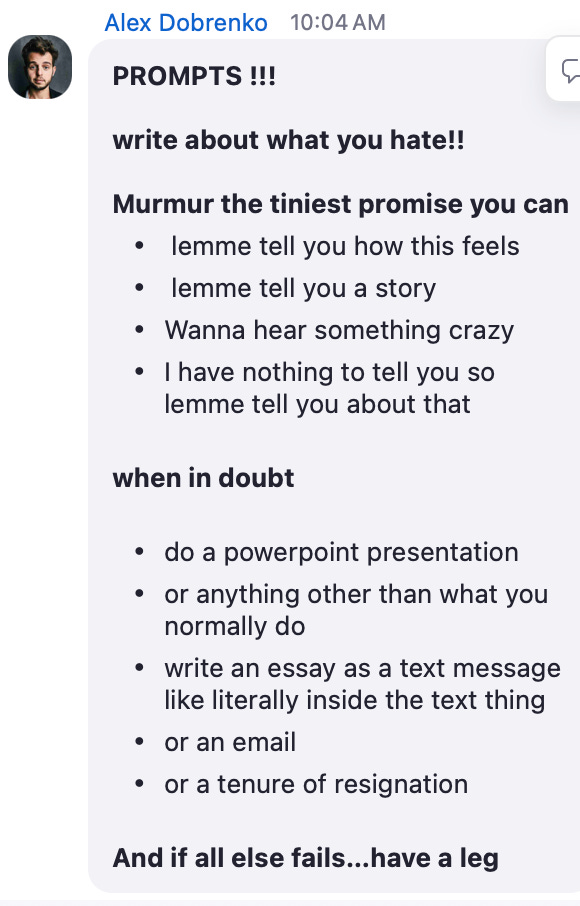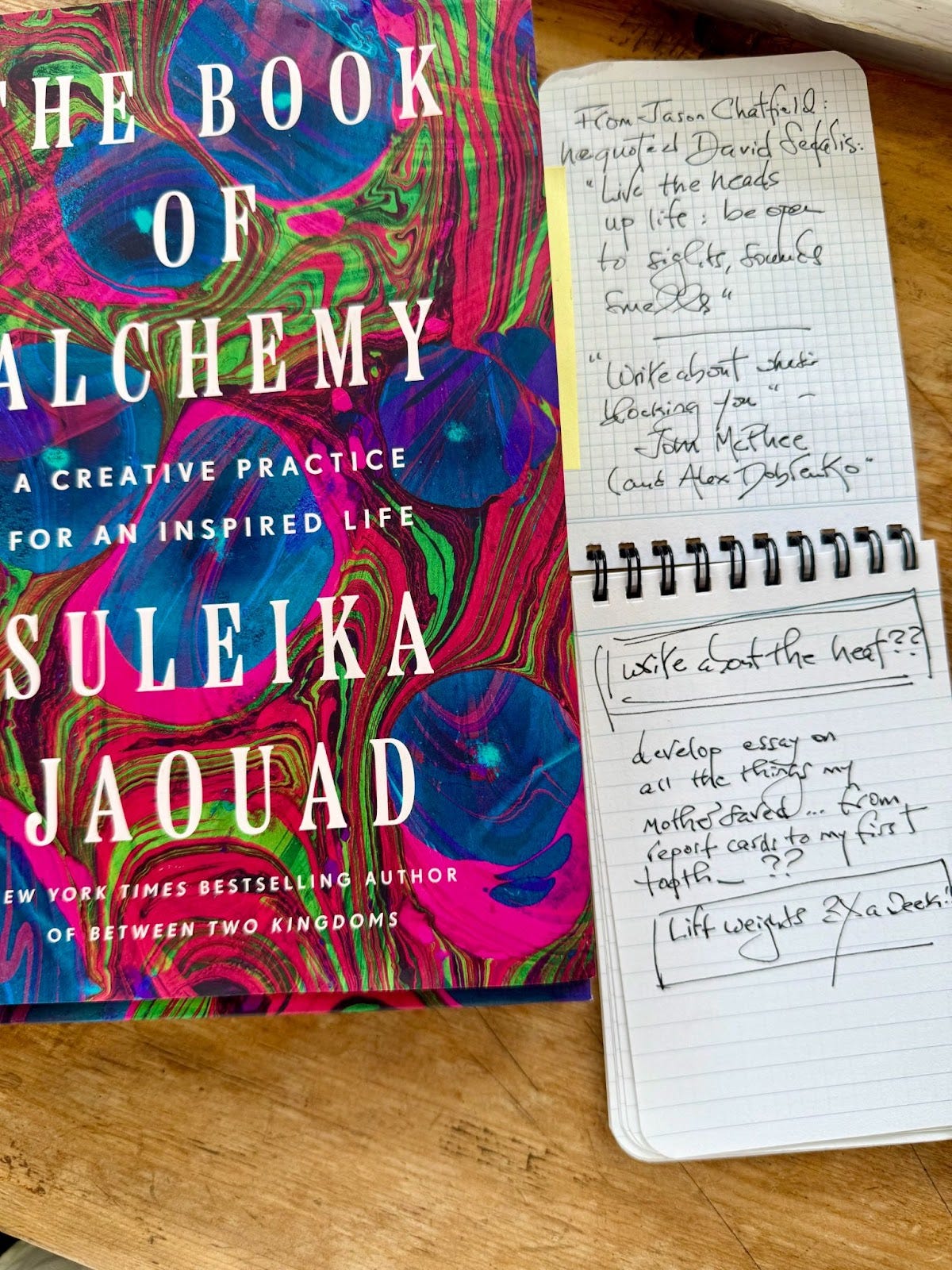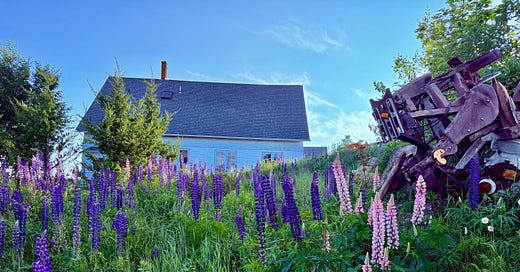7 [b]old ways I'm writing this summer
To sharpen my craft, eliminate depression, and maybe even kick my phone addiction
This is part of my occasional series of Writing Tips. One thing that did NOT make it onto this list (and probably should have!) is my tip on how to write short, because readers are busy. In other words, in writing, more is not necessarily MORE. That said, please wave and say hello! Or meet me in the questions for readers at the bottom.
Don’t miss #7 in today’s essay: I’m launching the No-Guilt [B]old Women Book Club, and you’re invited!
Let’s start here; this is me, waxing poetic:
“The different shades of lupin feed my soul: periwinkle blue, lilac, dusty rose. That’s how I know summer has arrived here on the coast of Maine. Then there’s the distinctive tang of the sea air, and sometimes the stink of fishermen’s bait, because Stonington, ME, where I live, is a fishing village and the largest lobster port in Maine. The sunsets are long and leisurely in June and the sky is luminescent.”
That’s rather lyrical, not really my usual style but that’s the point I am making today! Summer is here, bringing with it a whiff of boredom along with a gentle gust of inspiration; this season often brings a spell of depression for me, but I am determined to stave that off this year. (I can’t not mention the heat, which can addle the brain. Even here on the normally-temperate coast of Maine, we’re under a heat advisory, part of the dangerous heat wave enveloping much of the northeast of the U.S.1)
And so, this summer I want to do something a bit different with the rhythm and content of this newsletter. I want to keep myself creatively inspired, write consistently, and stay in touch with both other writers AND readers.
Herewith are the seven things I’m doing this summer (plus a BONUS tip) to shake up my writing routine, motivate myself, and keep to a weekly publishing schedule even when some days I’d rather be out walking or biking or cruising on our boat through the dozens of beautiful small islands that make up Merchant’s Row Archipelago2.
So here goes… take or leave what calls to you, what seems practical or useful. This list is as much for me as reminders, as it is for you, dear reader.
1. Glimmers
I am trying to pay better attention in general, to notice more, but this is a specific tip for writing that’s been in my toolbox for a while. I’m reminding myself to more intentionally notice “moments” in the outside world, in nature, as I move through the day. Well-known writer and teacher Pam Houston calls these moments glimmers and says they’re a foundational part of her writing practice. She explains:
“As I move through the world, I wait to feel something I call a glimmer, a vibration, a little charge of resonance that says, ‘Hey writer, look over here.’ I feel it deep in my chest, this buzzing that lets me know this thing I am seeing/hearing/smelling/tasting on the outside is going to help me unlock some part of a story….”3 - Pam Houston
Pam then keeps a list of these glimmers that she revisits, lumping related ones together to "create a kind of electricity" in her writing.
I first learned about this way of noticing from my literary agent4; I was discussing a possible book with her (a book I haven’t written, yet). She told me about Pam Houston and advised that I collect glimmers. I dug into my files and found this glimmer I wrote eight summers ago:
Noticed on a boat ride with my husband:
“Flung into the comforting, calm blankness of a summer afternoon where the only thing that matters is the light burning hard off the water of Penobscot Bay, and the perfect slope of creamy pink granite from the rim of the islands down to high tide water.”
2. Join a writing group
Whether it’s fear or laziness, it can be hard for me to sit down and write, alone, with just the blinking cursor and the blank page, so I’ve been trying something different recently. I’ve been co-writing (in real-time, via Zoom) with a small congenial group run by the funny, looney, lovable
, author of Both Are True (aka BAT). He’s started a paid subscriber community called the BATCAVE; when you join (aka pay) you get twice-weekly, two-hour co-writing sessions, called BATWRITES. Alex explains how BATWRITES work in his imitable ungrammatical style. I’ve tried to imitate it but I’m too wedded to punctuation:“lemme just say: no one reads their stuff at these!! you don’t have to even write. just do whatever the heck you want except be loud and annoying when we’re all silently working weirdo“ - excerpt from Alex’s post, dancing with the brain demons
I’m finding these writing sessions to be calming, as well as gently inspiring. I’m planning to join at least once a week this summer; the two-hour block is perfect. Here are writing tips he offered us in a recent session:

3. Take a craft class or read a craft book
This is an obvious one but it’s nice to remind myself. One craft book I’m dipping into this summer is the newly published The Book of Alchemy by
. She explains in the Introduction:“Designed to be a companion through life’s transitions and challenging times, The Book of Alchemy explores the art of journaling and all it can contain. Though I write about the creative process, this is not a craft book… Instead I share everything I’ve learned about how this life-altering and life-saving process can help us tap into that mystical trait that exists in every human: creativity.” - Suleika Jaouad in The Book of Alchemy
I’m fascinated by Suleika’s story, as well as an admirer of her writing. She’s an Emmy Award-winning journalist and a bestselling author, best known for her New York Times column Life, Interrupted, which she wrote from her hospital bed while being treated for leukemia. She’s also the author of the highly praised and bestselling memoir, Between Two Kingdoms, written after her recovery.
In addition to Suleika’s tips on journal writing (write every day, tell yourself you can burn it afterward, maybe call it the un-journal), The Book of Alchemy contains mini essays on creativity from dozens of writers as diverse as Dani Shapiro,
, Gloria Steinem, , Sarah Ruhl, Ann Patchett, and so many more.As for a craft class, I signed up for this one: How to write an essay collection with Alexander Chee. Note the word “collection.” Maybe there’s something I can do with 100 [B]old Age essay posts from the past two years… maybe not, but I want to explore that possibility. Another online resource I can highly recommend for a craft class is Writing Pad. I’ve taken their excellent memoir class from Autumn Stephens. Writing Pad also offers fiction, screenwriting and TV writing.
4. Read a poem every day
I was reminded recently, by author and writing teacher Lavinia Spalding, of how inspirational it can be to start each day by reading a poem. She tells us:
“I’ve read a poem every day for the past eleven years (another daily practice I ask of my Unfurlers (aka her students), but it wasn’t until I started keeping lists of teachers that I realized all my favorite poets write this way, as if they’re graduate students at Nature School, as if turtles, loons, and rain are their professors. Wendell Berry would have a PhD, his advisor the wood drake. David Whyte would be valedictorian. Mary Oliver graduated summa cum laude.” - Lavinia Spalding in What We Can Learn From Poets and Place.
I just realized, as I was writing this, that Lavinia’s approach to listing “turtles, loons, and rain” as teachers fits hand-in-glove with Pam Houston’s noticing glimmers! So I’m digging out one of my Mary Oliver collections to put within hands reach when I wake. Reading a poem slowly and carefully feels clean and refreshing; it’s so pleasurable, which, in an imaginary perfect world, is the first thing we feel when we put pen to paper, right?!
5. Put your phone down and scribble on paper
I have an inviolate practice of leaving my phone plugged in downstairs when I go up to bed. But in the morning, when I’m brewing that first cup of coffee, I’m drawn so strongly to pick it up… my UK readers are hours ahead of me, so I often check to see if any Comments from them came in overnight! Instead, when I'm about to reach for my phone, I want to try reaching for my notepad. My favorite things to scribble are rogue thoughts, doodly shapes (I can’t draw or sketch a scene or person for the life of me), ideas for this newsletter, the name of a poem I love and maybe the first line or two. I have trouble memorizing whole poems! These short first lines kept coming to me as I thought about the fog that is so much a part of the landscape here in Maine:
Fog By Carl Sandburg
The fog comes
on little cat feet…

6. Ask your readers to write you a letter
I did this last summer, inviting my readers to write to me5. I did it on a whim and as a way to take a break from writing a long essay. To my surprise, it prompted dozens of Comments, as well as a full postbox days later. I wrote back to everyone; it was a wonderful change of pace.
7. Join the No-Guilt [B]old Women Book Club!
Honest conversations about what growing old is really like, from the blessings to the bullshit, from gratitude to grief—inspired and guided by memoirs written by [b]older women. This will be a NO GUILT book club! No draconian rules for participating; if you haven’t finished the assigned book, Zoom in anyway.
The syllabus will start with
’s Still Life at Eighty; maybe we'll even get Abby to join us for part of the discussion. The point of the book club is to explore memoirs and writing by notable [b]old women, and let that guide us into exploring our own experiences of aging. You don’t need to be a [b]old woman to participate; every paid subscriber is welcome!We start in late July, and meet every six to eight weeks. More information coming soon! (All subscribers, free and paid, will get these updates.)
BONUS TIP: Take a break from your regular publishing schedule
But be intentional about it. My suggestion is to frame it not as a week off, but a week to brainstorm roguishly, to read more, to capture ideas for future writing. That said, that’s what I’m doing: I’m taking next Friday off, because it’s the 4th of July! I look forward very much to your comments and ideas on how to write through this historically hot summer. Here are some questions to get you thinking.
Questions for readers
Are you up for writing a glimmer and sharing it with us?6
Does writing, or reading, feel different to you in the summer?
How do you plan to stay inspired and creative this summer?
This Week’s Dangerous Heat, NYTimes, June 23, 2025
Map and description of Merchant’s Row Archipelago off of Stonington ME.
Send me a letter, handwritten (July 5, 2024)
Here’s an interview with Pam Houston to inspire you: Craft Advice with Pam Houston by Jane Ratcliffe (Sept. 26, 2024)
![[B]OLD AGE with Debbie Weil](https://substackcdn.com/image/fetch/$s_!i8Z0!,w_80,h_80,c_fill,f_auto,q_auto:good,fl_progressive:steep,g_auto/https%3A%2F%2Fsubstack-post-media.s3.amazonaws.com%2Fpublic%2Fimages%2Fdaaca764-d8d6-4a1b-bf58-61dbb72810fc_842x842.png)
![[B]OLD AGE with Debbie Weil](https://substackcdn.com/image/fetch/$s_!fEcd!,e_trim:10:white/e_trim:10:transparent/h_72,c_limit,f_auto,q_auto:good,fl_progressive:steep/https%3A%2F%2Fsubstack-post-media.s3.amazonaws.com%2Fpublic%2Fimages%2F95ad4442-e435-4ebc-a8d2-9c9b89a8bdb6_2100x400.png)

![[B]OLD AGE with Debbie Weil](https://substackcdn.com/image/fetch/$s_!i8Z0!,w_36,h_36,c_fill,f_auto,q_auto:good,fl_progressive:steep,g_auto/https%3A%2F%2Fsubstack-post-media.s3.amazonaws.com%2Fpublic%2Fimages%2Fdaaca764-d8d6-4a1b-bf58-61dbb72810fc_842x842.png)






Glimmers sparked my second book. I’d been posting vignettes on Facebook, with photos, about the small wonders found on a walk with my first dog. A writer friend told me, “You’ve got a book here.” I trusted her opinion and began to create Starter Dog.
Debbie you are the Lupine Lady IRL!! I loved this piece--I also realized, just last summer, that August can really bum me out. There's something so heavy about the heat and the languid nature of the loose, baggy days. I end up aching for the zip and structure of September, and I feel a twin remorse because 1) I'm not as happy as I should be in that golden, long-awaited month (we named a boy after that month it's so golden and sweetl!!) and 2) I'm just too fxn hot 'n agitated. Last year, we scheduled our (first ever) family trip abroad at the end of June/ July to maximize days my hubby could take off w/ the 4th included. This year, we moved our trip to late August to mitigate some of the late summer heft. I'll report back! This feels like a good topic for a poll!